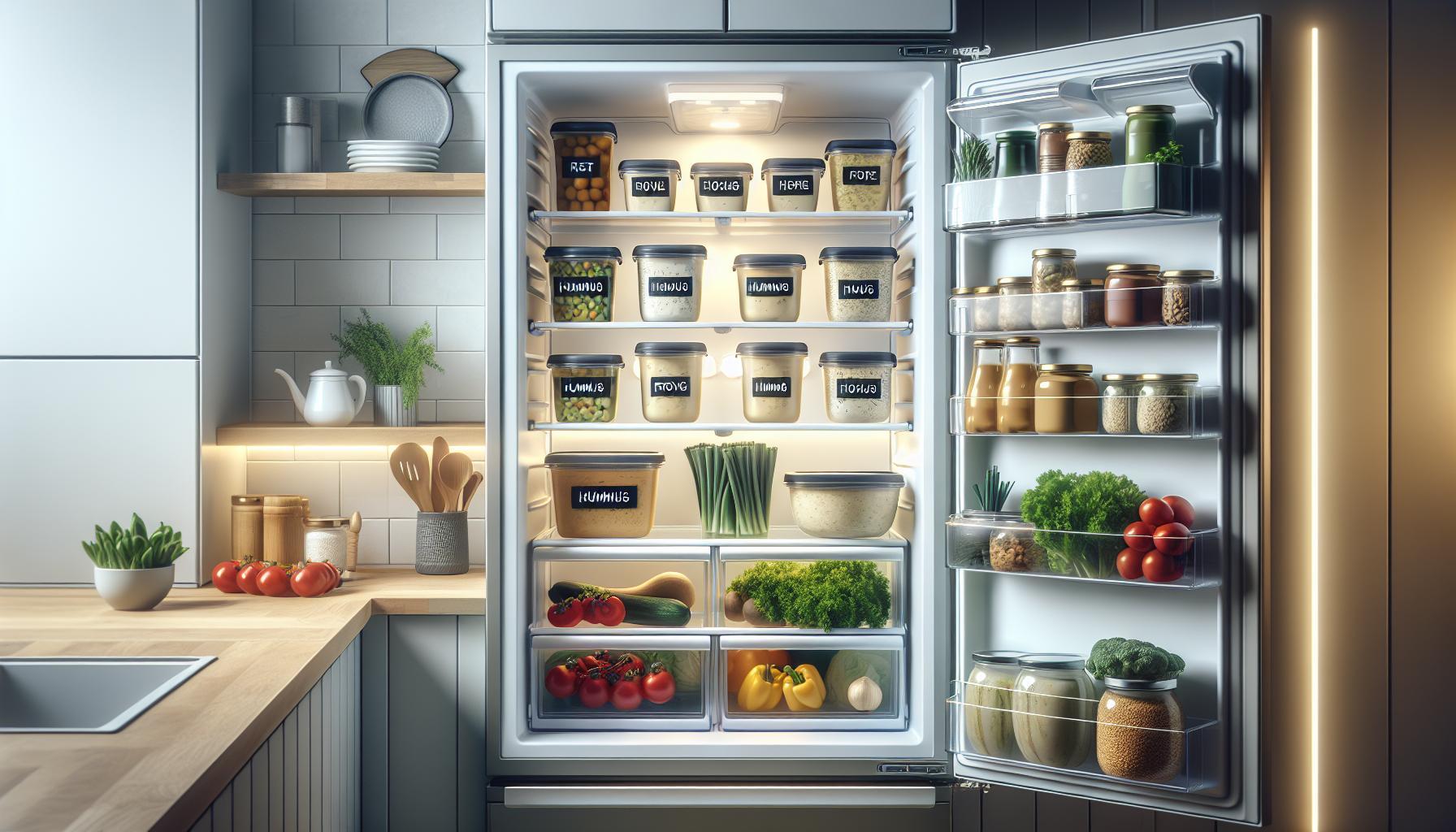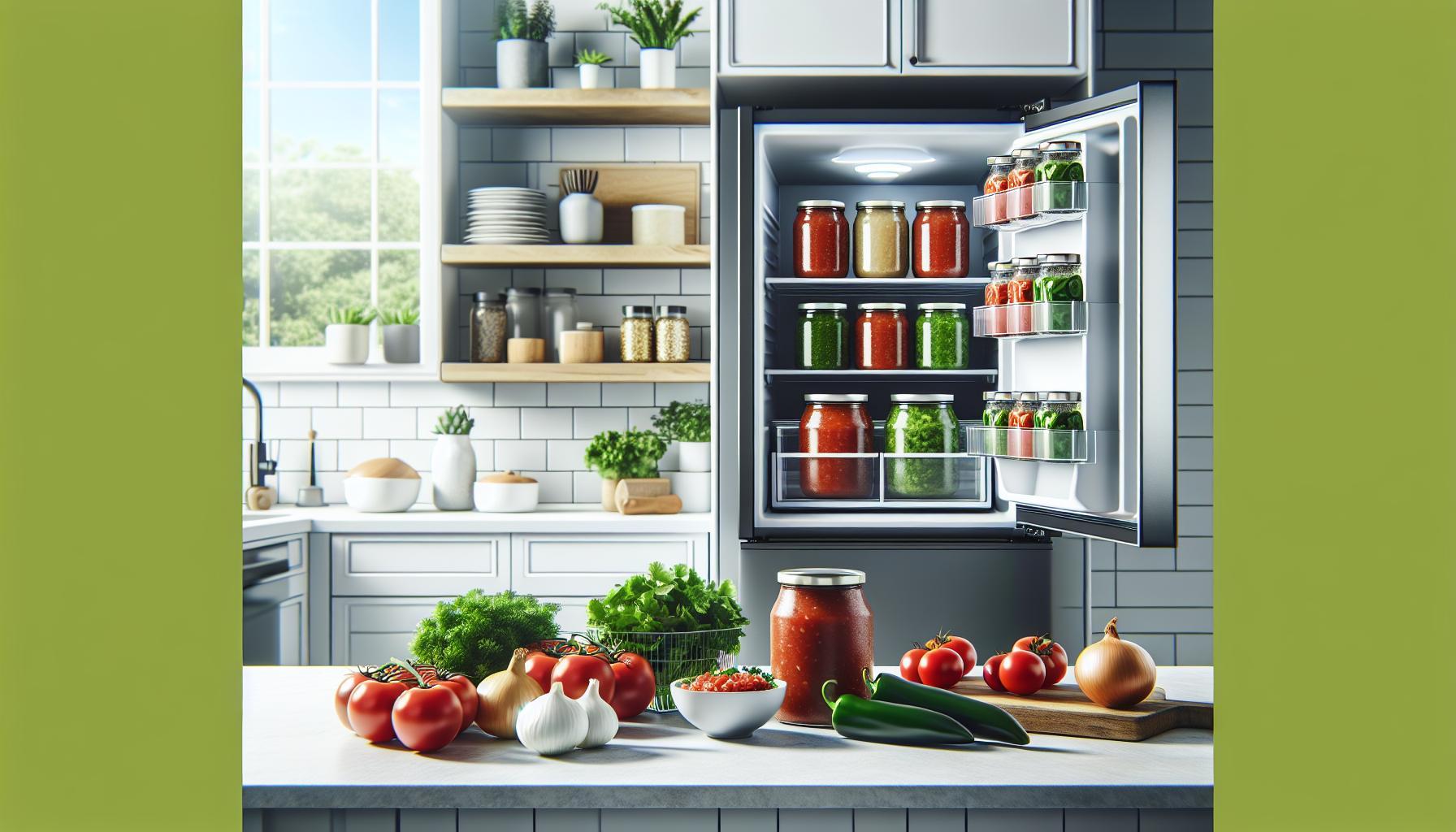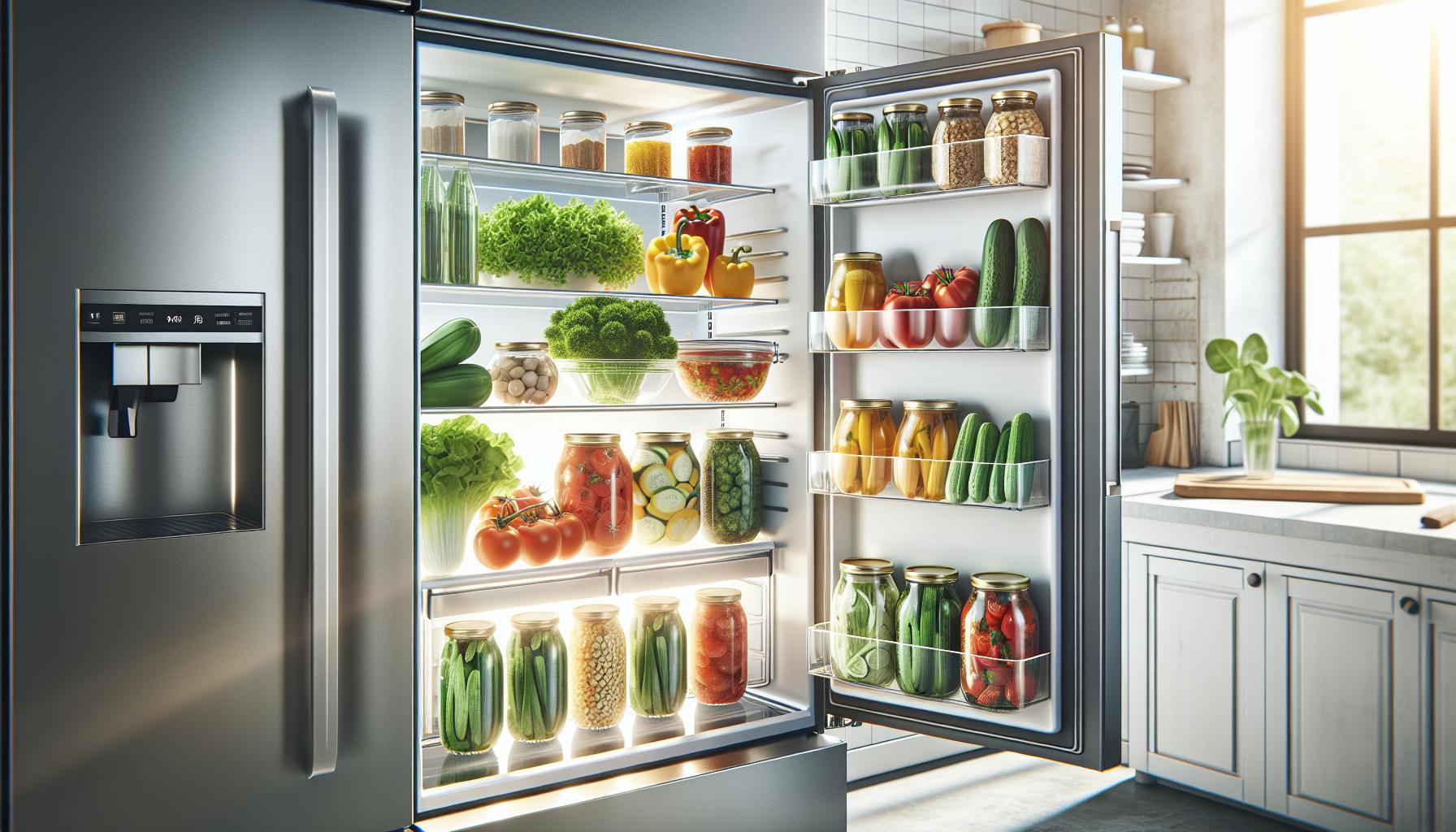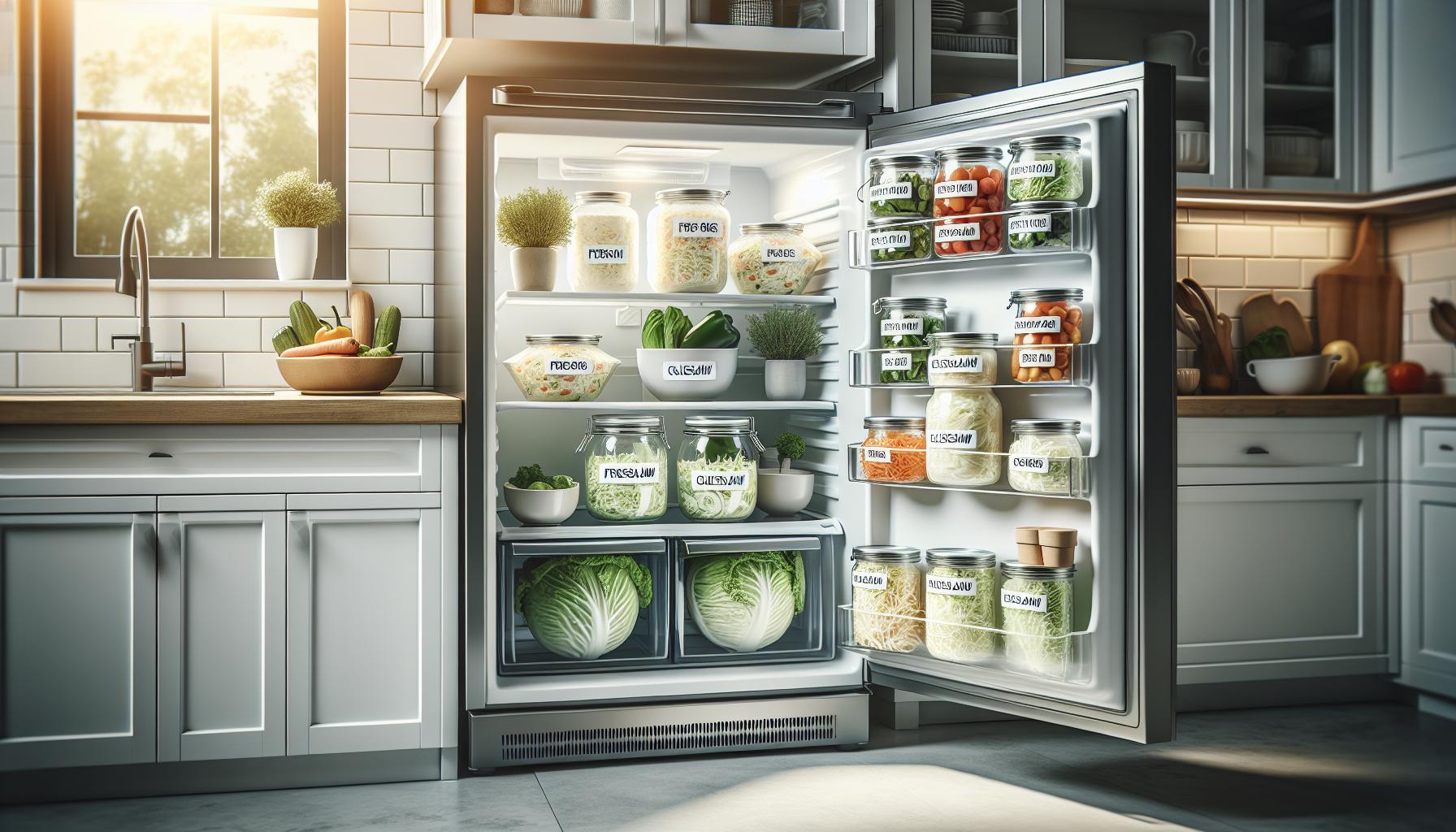Did you know that hummus, a staple in many kitchens around the world, can last up to a week in the fridge? As this delicious dip becomes a favorite for snacking and entertaining, understanding its shelf life is crucial. Proper storage ensures not only the best flavor but also your safety.
Many people worry about food spoilage, especially when it comes to homemade or store-bought hummus. With its blend of chickpeas, tahini, and spices, hummus can be a nutritional powerhouse-so you’ll want to enjoy every last scoop with confidence. In this guide, we’ll provide you with essential tips on how long hummus lasts in the fridge, helping you make informed decisions on when to indulge and when to toss. Keep reading to ensure your next hummus experience is both tasty and safe!
How Long Can Hummus Last in the Fridge?
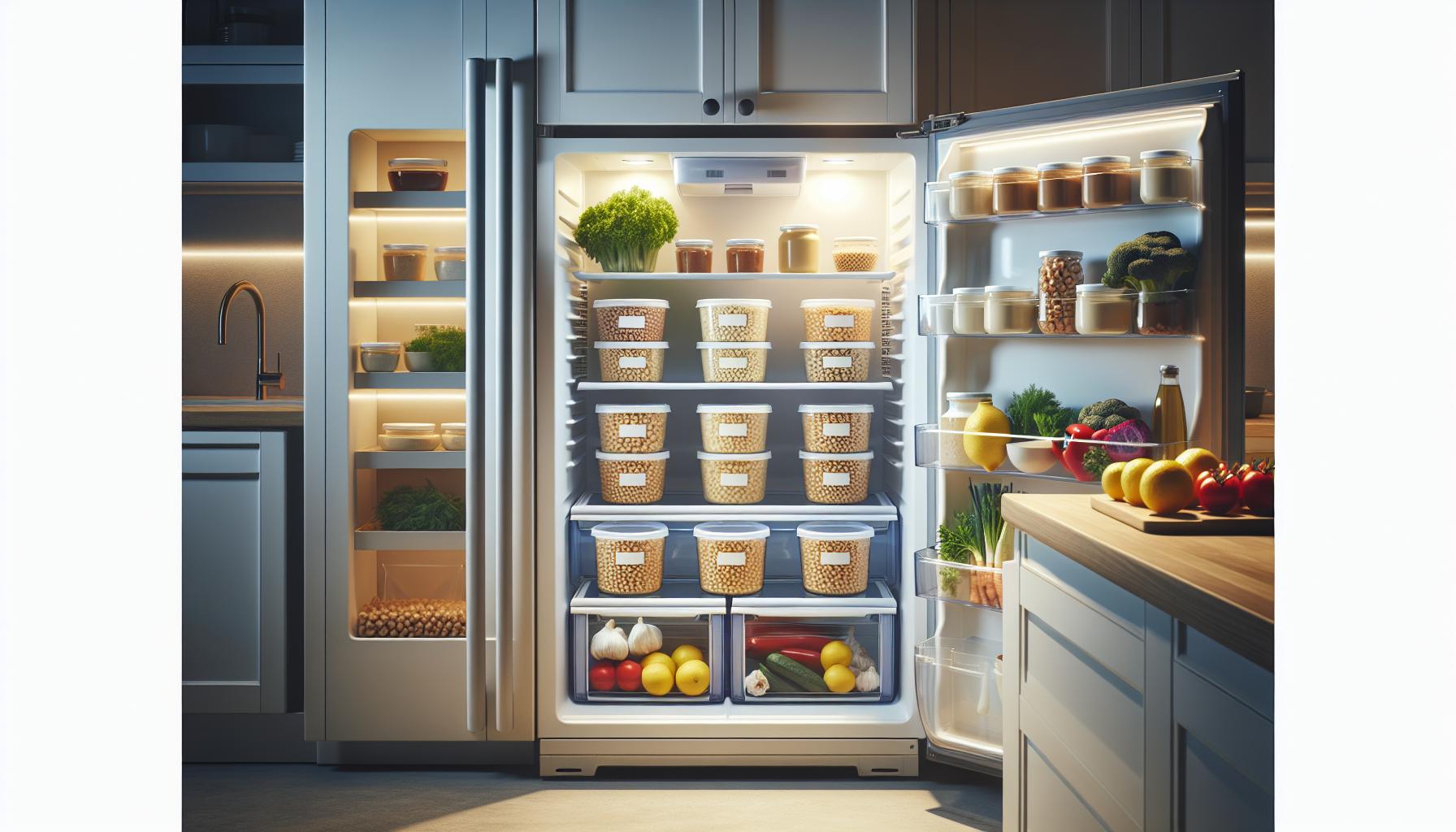
Hummus is a beloved dip, known for its creamy texture and delightful flavor, but how long can it stay fresh in the fridge? Generally, homemade hummus will maintain its best quality for about 3 to 7 days when stored properly. Store-bought hummus, on the other hand, often comes with a shelf life of about 7 to 10 days after opening. The key variable in both cases is how well the hummus is stored. Air exposure and contact with utensils can significantly affect its longevity.
To ensure that your hummus lasts as long as possible, it’s important to keep it in an airtight container. This prevents the dip from drying out and protects it from absorbing any odors in the fridge. If you’ve made a large batch of homemade hummus, consider dividing it into smaller portions and storing them in separate containers. This way, you only open what you need, preserving the freshness of the remaining hummus.
When assessing the freshness of your hummus, always err on the side of caution. If you’re near the end of the recommended storage time, check for any signs of spoilage, such as an off smell, discoloration, or mold. If in doubt, it’s best to discard any hummus that seems questionable to avoid foodborne illness.
Factors Affecting Hummus Shelf Life
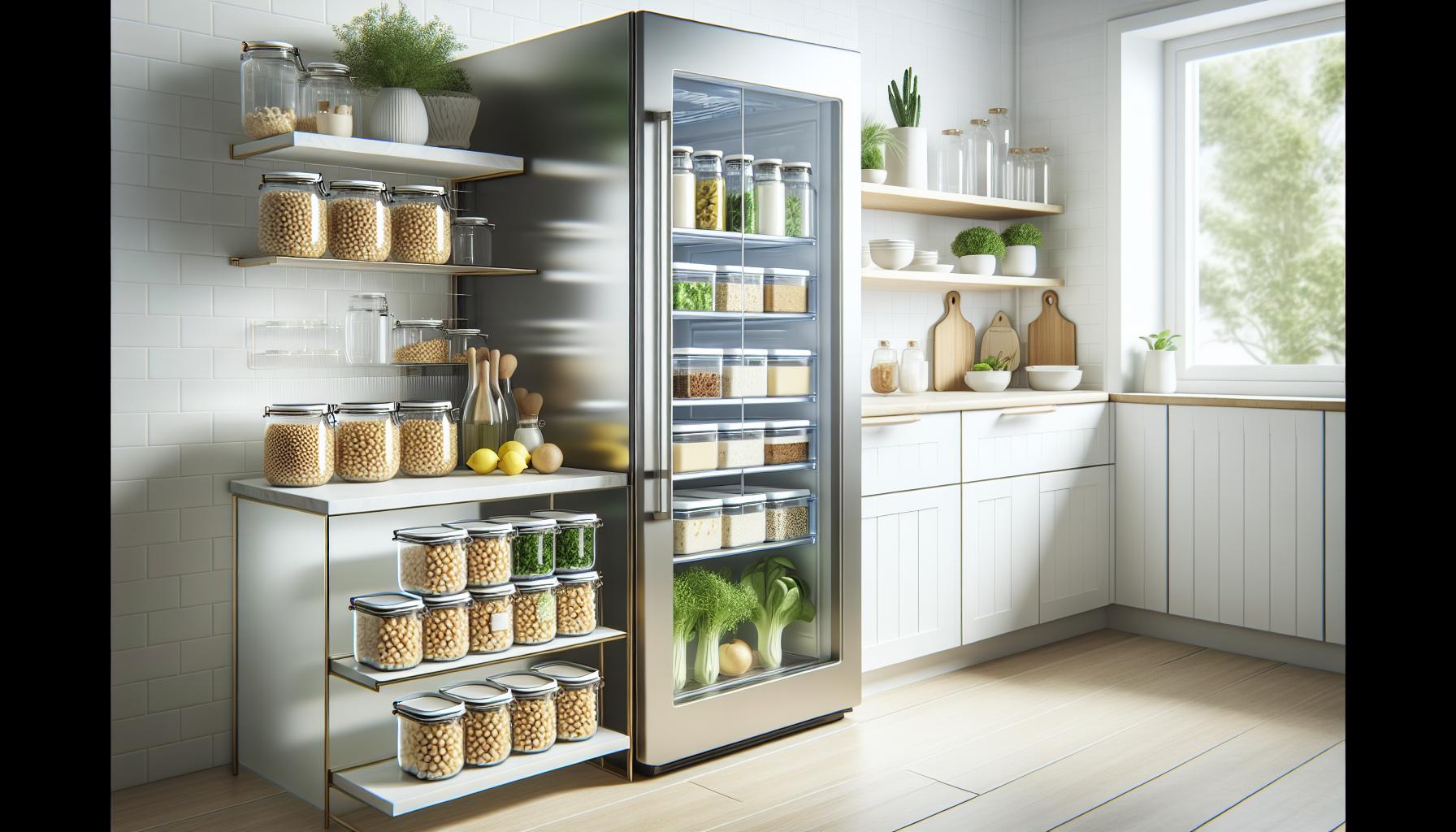
The freshness of hummus can be impacted by several factors that influence its shelf life, making it essential to understand how to store it effectively. One of the primary factors is the ingredients used in the hummus. Homemade versions may contain fewer preservatives than store-bought varieties, which can allow natural spoilage to occur more quickly. Variations in ingredient quality, such as the freshness of the chickpeas or the potency of any herbs and spices used, also play a significant role. For instance, hummus made with freshly squeezed lemon juice may have a shorter shelf life compared to that made with bottled lemon juice due to differences in acidity levels.
Another important aspect is the exposure to air. When hummus is frequently removed from its container or stirred with non-clean utensils, it becomes exposed to air, which can lead to oxidation and spoilage. This is why it’s advised to use clean utensils and store hummus in airtight containers. The composition of the hummus – whether it contains additional ingredients like garlic or oil – may also affect its longevity. Garlic, for instance, can introduce bacteria if not stored properly, which might reduce the shelf life of the dip.
Temperature is another critical factor. Hummus should always be stored in the refrigerator at or below 40°F (4°C). Leaving it out at room temperature can significantly diminish its freshness, with exposure to warm environments accelerating spoilage processes. It’s advisable to return any leftover hummus to the refrigerator promptly after serving.
Lastly, the duration since preparation or opening is a crucial determinant of how long hummus will last. Homemade hummus generally keeps well for about 3 to 7 days, while store-bought varieties can last from 7 to 10 days. Thus, being attentive to these factors and best practices will help in enjoying your hummus while it’s at its best quality.
Signs of Spoilage: When to Discard Hummus
Determining the freshness of hummus can be a bit tricky and requires a careful examination beyond just relying on the expiration date. The first step in assessing whether your hummus is still good to eat is to check for any visible signs of spoilage. If you notice a change in color, such as a dull or darker appearance compared to its original creamy hue, it may be time to discard it. Additionally, any mold growth – which can appear as fuzzy spots or discolorations on the surface – is a clear indicator that your hummus is no longer safe to consume.
The smell of hummus can also provide crucial clues about its freshness. Fresh hummus typically has a pleasant, earthy aroma, supplemented by the tangy notes of lemon and garlic. If you detect a sour or off-putting smell, this is often a sign of fermentation or spoilage, indicating that the hummus should not be eaten. Taste testing is another option, but if there are any doubts about the smell or appearance, it’s better to err on the side of caution and not sample it.
Lastly, be aware of changes in texture. Fresh hummus should have a smooth and creamy consistency. If it becomes excessively watery or grainy, this indicates that it has started to break down. Such texture changes can happen due to exposure to air or if it has been stored for a longer period than recommended-3 to 7 days for homemade hummus and up to 10 days for store-bought. Following these signs and utilizing your senses will help ensure that you enjoy your hummus at its best while avoiding any food safety risks.
Best Practices for Storing Hummus
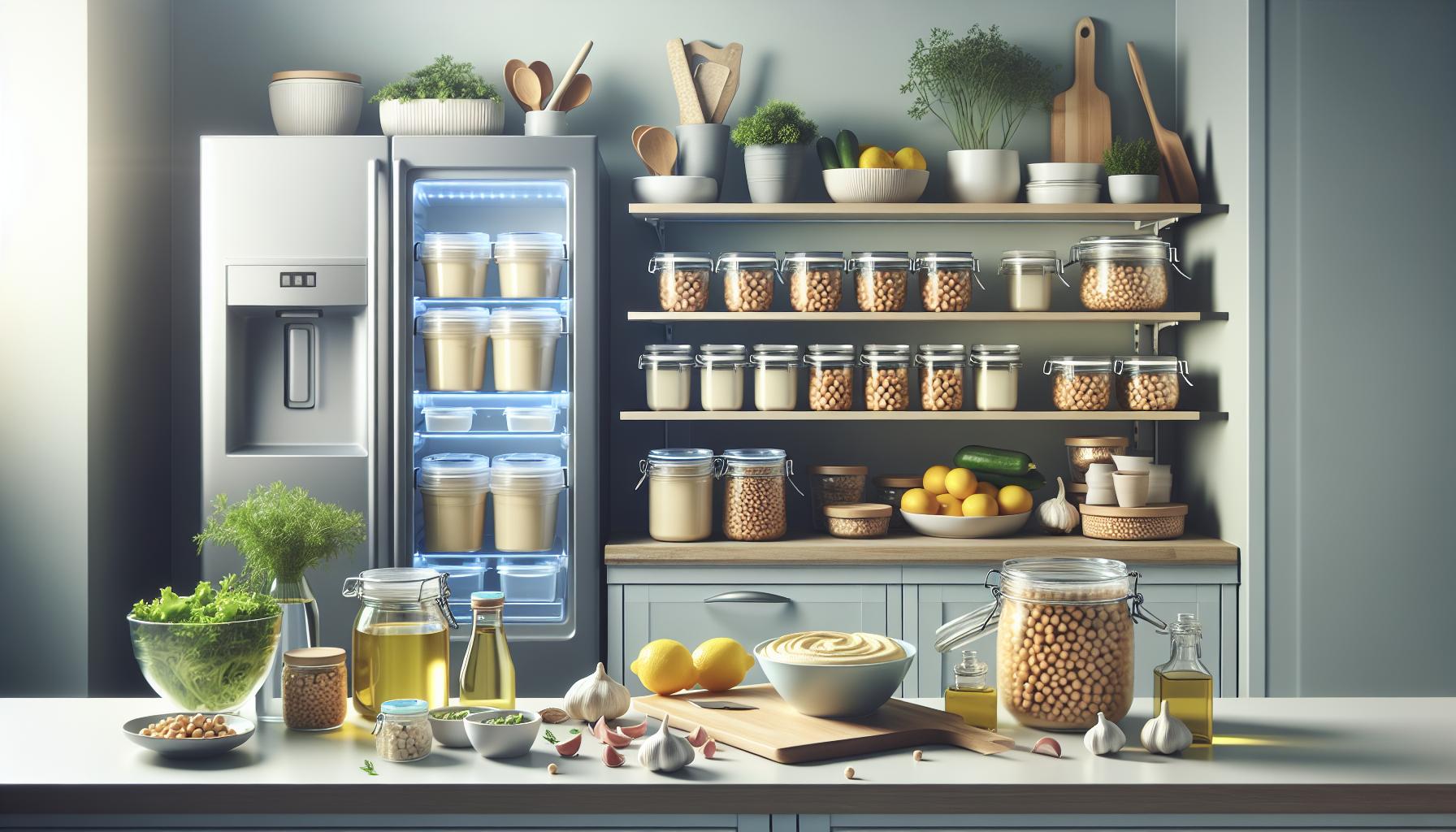
Properly storing hummus can significantly extend its shelf life and keep it tasting fresh and delicious. To maintain the quality of your hummus, consider these best practices that can help you enjoy this tasty dip without worrying about spoilage.
First and foremost, always store your hummus in an airtight container. This minimizes exposure to oxygen, which can accelerate spoilage and affect texture. If you’ve made homemade hummus, transfer it to a clean, dry container and press a piece of plastic wrap directly onto the surface before sealing the lid. This extra layer helps prevent air from entering and can keep your hummus fresher for longer. For store-bought varieties, make sure the lid is securely closed after each use.
Temperature Matters
It’s crucial to keep hummus refrigerated at all times when not in use. The optimal temperature for storing hummus is below 40°F (4°C). This environment inhibits the growth of harmful bacteria. Place the container in the main body of the refrigerator rather than the door, where temperatures can fluctuate. Homemade hummus typically lasts about 3 to 7 days in the refrigerator, while commercially prepared hummus can last up to 10 days from the opening date.
Portion Control
Another effective strategy is portioning out hummus into smaller containers before refrigeration. This way, you minimize the time the larger batch is exposed to air and contaminants each time you open it. If you find yourself with excess hummus that you won’t consume in the near future, consider freezing it.
Freezing Options
To freeze hummus, place it in a freezer-safe container, leaving a little space at the top for expansion. You can also choose to freeze it in ice cube trays, allowing you to thaw only what you need. When properly stored, frozen hummus can last up to four months. When ready to use, simply transfer it to the refrigerator to thaw overnight. Enjoying fresh hummus at its best is about keeping it vibrant and safe-following these storage practices will help you dip with confidence!
Freezing Hummus: How and When
To ensure that your hummus remains fresh and delicious, freezing is an excellent option, especially if you’ve made a large batch or have store-bought leftovers that you cannot consume in time. Freezing hummus not only extends its shelf life significantly – up to four months – but it also preserves the flavors and textures that make this Mediterranean staple so enjoyable.
First, it’s essential to choose the right container for freezing. Use a freezer-safe, airtight container and leave a little space at the top for the hummus to expand as it freezes. Another practical approach is to freeze hummus in ice cube trays. This method allows you to portion out small amounts that can be thawed as needed, minimizing waste and making it easy to add hummus to dishes like soups or salads. Regardless of your chosen method, ensure that the hummus is well-sealed to prevent freezer burn, which can negatively affect its taste and texture.
When you’re ready to use your frozen hummus, transfer it to the refrigerator and let it thaw overnight. For those in a pinch, you can thaw it gently in the microwave or at room temperature, but be cautious not to leave it out too long to avoid bacterial growth. Once thawed, the consistency might be slightly different than freshly made hummus; a quick stir can help revive its creamy texture. If you find it has thickened, adding a splash of olive oil or a small amount of water can help restore its creaminess, ensuring that every scoop is smooth and delicious.
By taking these steps, you can confidently store and enjoy your hummus long after its initial preparation, making the most of this nutritious and versatile dip.
Homemade vs. Store-Bought: Shelf Life Comparison
Homemade hummus offers the advantage of fresh ingredients and customizable flavors, making it a favorite among many enthusiasts. When stored properly in the refrigerator, homemade hummus typically lasts about 3 to 5 days. This shorter shelf life is primarily due to the absence of preservatives and the variable quality of fresh ingredients used, such as herbs, garlic, and lemon juice. To extend freshness, store your homemade batch in an airtight container and drizzle a thin layer of olive oil on top to create a barrier against air.
In contrast, store-bought hummus often comes with added preservatives that significantly enhance its shelf life. Most commercially prepared varieties can last up to 7 to 10 days once opened, or even longer if left unopened-usually several weeks, depending on the brand and ingredients. It’s essential to check the expiration date on the packaging for specific guidance. Store-bought hummus also tends to have a consistently smooth texture and taste due to industrial production methods that are hard to replicate at home.
When deciding between homemade and store-bought hummus, consider the serving size and your intended use. If you frequently incorporate hummus into your meals, having a store-bought option can provide convenience without compromising much on flavor or safety. However, if you’re looking for a specific taste or healthier additives, homemade may be the way to go. Regardless of the choice, always monitor for signs of spoilage such as off odors, discoloration, or separation, which can indicate that it’s time to discard the hummus.
In summary, whether you choose to whip up your own batch or rely on store-bought, understanding the shelf life can help you minimize waste and enjoy hummus at its best. Use proper storage techniques to maximize freshness, and remember that sensory checks can guide you in determining the safety and quality of your dip.
Creative Uses for Leftover Hummus
A versatile pantry staple, hummus can be more than just a dip for your veggies and pita bread. If you find yourself with leftovers, there are numerous creative ways to integrate this delicious spread into your meals, ensuring you don’t waste any of that creamy goodness while also adding flavor and nutrition to your dishes.
Consider using hummus as a spread on sandwiches or wraps. It adds a rich, nutty flavor, while also serving as a moisture agent. Pair it with grilled veggies, fresh greens, or roasted meats for a satisfying lunch. You can also mix hummus into salad dressings. Just blend it with some olive oil, vinegar, and your favorite spices to create a creamy dressing that enhances green salads, grain bowls, or roasted vegetables.
Hummus can also elevate traditional dishes. Substitute it for mayonnaise in pasta salads or use it as a base for baked dishes like hummus-based casseroles. Additionally, mixing hummus into soups can create a creamy texture, making it a great addition to vegetable or lentil soups that need a boost of flavor.
Moreover, adding a bit of hummus to your smoothies may surprise you. The creamy texture and protein content can complement fruits and vegetables without overwhelming the overall flavor. Just be sure to balance the quantities to maintain a tasty blend.
If you still have leftover hummus as the expiration date approaches, think about freezing it in portions. This way, you can extend its life while having easy access to a convenient snack or ingredient that you can pull out anytime. Just remember to seal it in an airtight container, allowing for some expansion, and label it with the date to ensure safety and freshness.
By incorporating these innovative ideas, not only do you minimize food waste, but you also open up a world of culinary possibilities with leftover hummus, proving it to be an indispensable ingredient in your kitchen.
Nutritional Value of Hummus and Storage Impact
Hummus is not only a delicious spread but also nutritional powerhouse packed with key vitamins, minerals, and healthy fats. Made primarily from chickpeas, tahini, olive oil, and garlic, hummus provides a range of essential nutrients including protein, fiber, vitamins B and E, and minerals such as iron and magnesium. These components contribute to various health benefits, including improved digestion, heart health, and sustained energy levels.
The nutritional value of hummus can be impacted by how it is stored. Typically, homemade hummus can last in the refrigerator for about 3 to 5 days, while store-bought versions, which often contain preservatives, may last a bit longer-up to a week or more as indicated on the packaging. However, once opened, even store-bought hummus should be consumed within 5 to 7 days for optimal freshness and safety. Proper storage is crucial; keeping hummus in an airtight container helps maintain moisture and prevents contamination, which is essential in preserving its nutritional profile over time.
To maximize freshness, consider portioning out hummus into smaller containers for convenience rather than frequent opening of a single large container. This minimizes exposure to air and bacteria, extending its shelf life. If you notice any changes in color, texture, or aroma, it’s best to err on the side of caution and discard it. Additionally, while hummus can be frozen to prolong its life for up to 4 months, freezing may alter its creamy texture slightly. Thawing in the refrigerator and giving it a good stir before serving can help revive its smoothness, making it an excellent option for future use without sacrificing too much of its nutritional benefits.
Common Myths About Hummus Shelf Life
Many people cherish hummus for its rich flavor and versatility, but misconceptions about its shelf life can lead to unnecessary waste or, worse, food safety issues. One common myth is that hummus can last indefinitely in the fridge if it doesn’t show visible signs of spoilage. In reality, even if the hummus appears fine, it should typically be consumed within 3 to 5 days for homemade versions and within 5 to 7 days once opened for store-bought options. The presence of preservatives in commercial hummus may extend its shelf life slightly, but being mindful of storage practices is still crucial.
Another prevalent belief is that freezing hummus significantly alters its texture and flavor beyond recovery. While it is true that freezing can change the consistency, proper thawing techniques can help restore it. After defrosting in the refrigerator, stirring the hummus can recover much of its creaminess. Thus, if you want to prolong the shelf life without the fear of waste, freezing is a practical solution.
Some people also think that hummus can be kept for longer periods simply by adding more olive oil or spices. While these additions may temporarily mask signs of spoilage, they do not extend the overall shelf life of hummus. Instead, they can encourage further microbial growth if the hummus is nearing its expiration date. Lastly, there’s a misconception regarding the safety of consuming hummus that’s close to its expiration date. It’s best to trust your senses-if the hummus has a sour smell, changes in color, or an off-putting texture, it’s safer to discard it rather than take the risk.
Being informed about these common myths enables you to enjoy hummus confidently while ensuring both your health and sustainability of your food choices.
How to Revive Hummus After Storage
When it comes to preserving the silky, creamy delight that is hummus, knowing how to rejuvenate it after some time in the fridge can be a game changer. Hummus can thicken or develop a crust on top after storage, but with a few easy steps, you can revive it to its original glory. To start, take your hummus out of the refrigerator and allow it to sit at room temperature for about 10-15 minutes. This will make it easier to mix and restore its creamy texture.
Once the hummus has slightly warmed, transfer it to a mixing bowl. At this stage, the key is to introduce moisture back into the mixture. A drizzle of olive oil or a few tablespoons of water can do wonders. Gradually add the liquid while stirring with a spoon or spatula. This will break up any hardened sections and incorporate the newly added moisture throughout the hummus. If desired, you can also add a touch of tahini or fresh lemon juice to enhance the flavor as you mix.
For particularly thick hummus, using a hand mixer or food processor can be effective as well. Blend it for a minute or two until you reach the desired consistency. The incorporation of air from the mixing process can also improve the texture, giving the hummus a lighter, fluffier feel.
If you feel adventurous, this is also an excellent opportunity to infuse the hummus with new flavors. Consider adding garlic powder, smoked paprika, or herbs like dill or parsley during this revitalization process. Just a pinch of spice can transform yesterday’s hummus into a delightful dip that feels fresh and new.
In summary, with a little patience and the right technique, it’s entirely possible to enjoy your refrigerated hummus even after several days. By incorporating moisture and mixing thoroughly, you can keep this beloved dip at its best and reduce food waste, ensuring each bite is just as enjoyable as the first.
Tips for Extending Hummus Freshness
To savor every bite of your hummus and keep it fresh for longer, consider these practical tips. One crucial factor in maximizing its shelf life is ensuring proper storage. Always store hummus in an airtight container, as exposure to air can lead to oxidation, which not only degrades flavor but also promotes spoilage. Alternatively, if you buy hummus in larger containers, consider dividing it into smaller portions. This minimizes reheating and handling of the entire batch, which can introduce bacteria and moisture.
When it comes to ingredients, using fresh, high-quality components can make a significant difference in both taste and longevity. If possible, prepare your hummus with organic chickpeas and freshly squeezed lemon juice, as these can enhance the flavor and nutritional profile. Additionally, adding a thin layer of olive oil on top before sealing can create an extra barrier against air, which further extends its freshness.
Keep a vigilant eye on storage temperatures as well. Hummus should always be refrigerated below 40°F (4°C) and not left out at room temperature for more than two hours. For long-term storage, freezing is an excellent option. Hummus can comfortably last for up to four months in the freezer without compromising quality. Just be sure to store it in freezer-safe containers, leaving some room for expansion, as hummus can expand when frozen.
Lastly, consider creative ways to use your leftover hummus before it reaches the end of its shelf life. From adding it to sandwiches and wraps to using it as a flavorful base for salad dressings or sauces, there are numerous opportunities to incorporate hummus into various dishes. By following these guidelines, you can ensure that your hummus remains a delightful, flavorful dip for as long as possible, making food waste a thing of the past.
Safety Guidelines for Food Storage
To enjoy hummus safely and prevent foodborne illnesses, it’s essential to follow specific storage guidelines. Hummus, when prepared and stored correctly, can be a delicious addition to your meals, but improper handling can lead to spoilage. Here are the key practices to ensure your hummus stays fresh and safe for consumption.
Proper Refrigeration
Hummus should always be stored in the refrigerator at a temperature of ≤40°F (4°C). If left out at room temperature for more than two hours, harmful bacteria can begin to proliferate. If the ambient temperature is above 90°F (32°C), this window shortens to just one hour. Therefore, it’s crucial to return leftover hummus to the fridge promptly after serving.
Airtight Storage
Whenever possible, keep hummus in an airtight container. This prevents exposure to air, which can lead to oxidation and spoilage. For stores-bought hummus, make sure to seal the lid tightly after each use. If you’ve made homemade hummus, use glass or plastic containers with secure lids to enhance shelf life.
Using Clean Utensils
Always use clean utensils when scooping out hummus to avoid introducing contaminants. Double-dipping or using utensils that have touched other food can introduce bacteria that lead to quicker spoilage. If serving at gatherings, consider providing individual servings or using a serving spoon to minimize cross-contamination.
Freezing for Longevity
For those looking to extend the life of hummus beyond a week, freezing is an excellent option. Hummus can last up to four months in the freezer. Store it in freezer-safe containers, leaving some room for expansion during freezing, and thaw it in the refrigerator when ready to use.
By following these guidelines, you can dip into your hummus with confidence, knowing that you’ve taken steps to preserve its freshness and safety.
Frequently asked questions
Q: How can you tell if hummus is bad?
A: You can tell if hummus is bad by checking for a sour smell, discoloration, or mold on the surface. Additionally, if the texture has become excessively watery or gritty, it’s best to discard it. Always trust your senses-when in doubt, throw it out.
Q: Can you eat hummus after the expiration date?
A: Eating hummus after the expiration date is not recommended, as it may pose food safety risks. If it has been stored correctly and shows no signs of spoilage, it might still be safe for a few days past the date, but always exercise caution.
Q: How long does homemade hummus last in the fridge?
A: Homemade hummus typically lasts about 4 to 7 days in the fridge. Store it in an airtight container to maximize freshness, and remember to check for any signs of spoilage before consuming.
Q: Is it safe to freeze hummus?
A: Yes, it is safe to freeze hummus. To maintain its quality, transfer it to an airtight container and leave some space for expansion. Hummus can last up to 4 months in the freezer; simply thaw it in the fridge before use.
Q: What’s the best way to store leftover hummus?
A: The best way to store leftover hummus is in an airtight container in the fridge. This helps prevent exposure to air, which can cause spoilage. For optimal freshness, consume it within one week and always check for spoilage before eating.
Q: Can you use hummus as a salad dressing?
A: Yes, hummus can be used as a salad dressing. Thin it out with a bit of water, lemon juice, or olive oil for a creamy, flavorful dressing. This is a great way to use up leftover hummus creatively.
Q: How long does store-bought hummus last in the fridge once opened?
A: Store-bought hummus typically lasts about 5 to 7 days in the fridge after opening. Always check the “use by” date on the packaging and store it in an airtight container to keep it fresh longer.
Q: What should you do with hummus if it separates?
A: If your hummus separates, simply give it a good stir before serving. This is a normal occurrence, especially in homemade varieties, and doesn’t indicate spoilage. If it smells or looks off, however, it’s best to discard it.
Wrapping Up
Whether you’ve made a batch of delicious homemade hummus or you’re enjoying store-bought, knowing how long hummus lasts in the fridge is key to ensuring both safety and taste. Remember, homemade hummus generally stays fresh for about 4 to 7 days, while store-bought versions can last up to a couple of weeks if unopened. For best quality, always check for signs of spoilage before diving back in.
Ready to elevate your hummus game? Explore our delicious hummus recipes for creativity in your kitchen or discover the nutritional benefits of hummus that can complement your healthy lifestyle. Don’t let your leftovers go to waste – dip with confidence and enjoy every last bite! Share your thoughts or experiences with us in the comments, and consider subscribing to our newsletter for more tips and recipes that keep you inspired!

